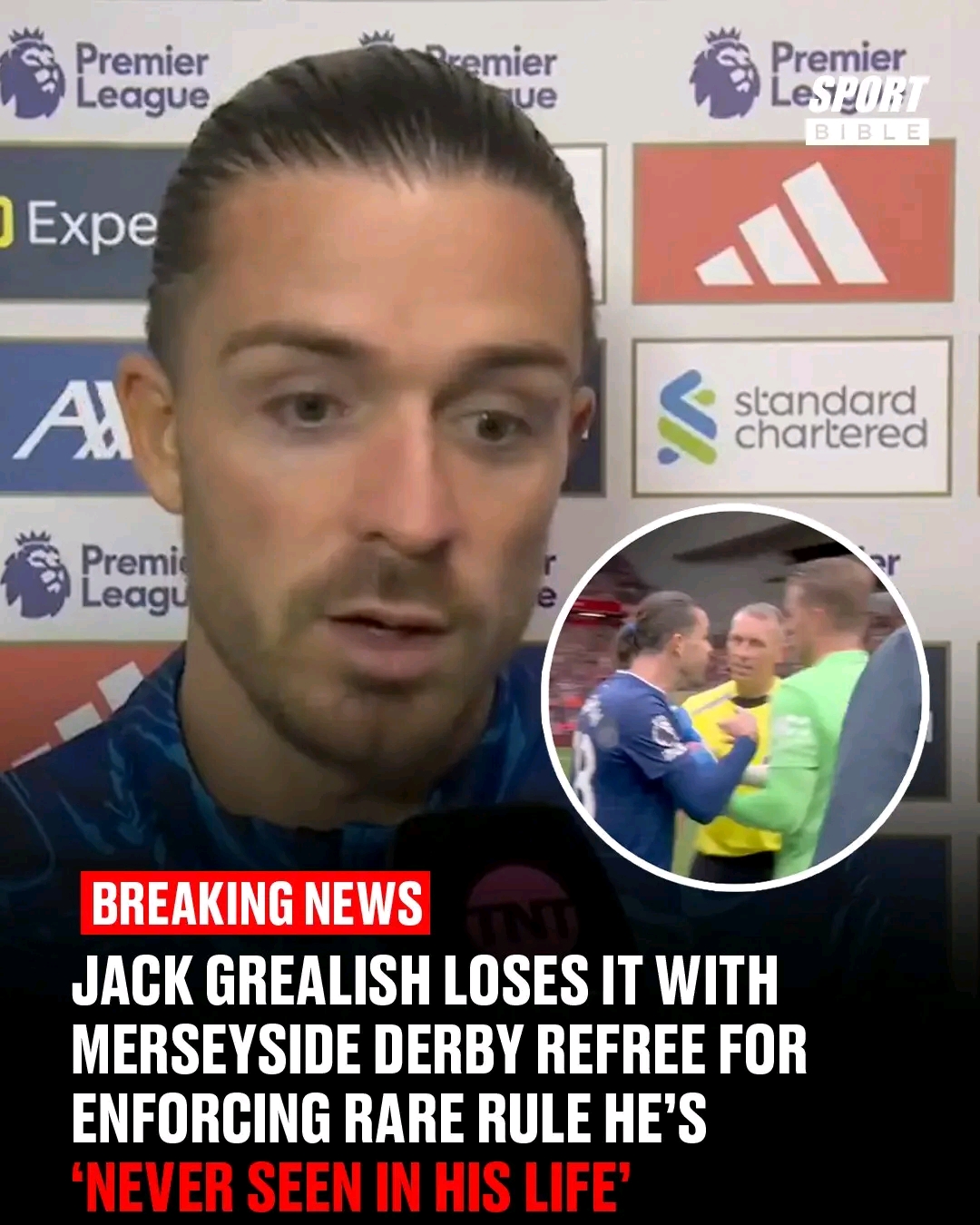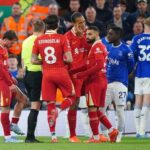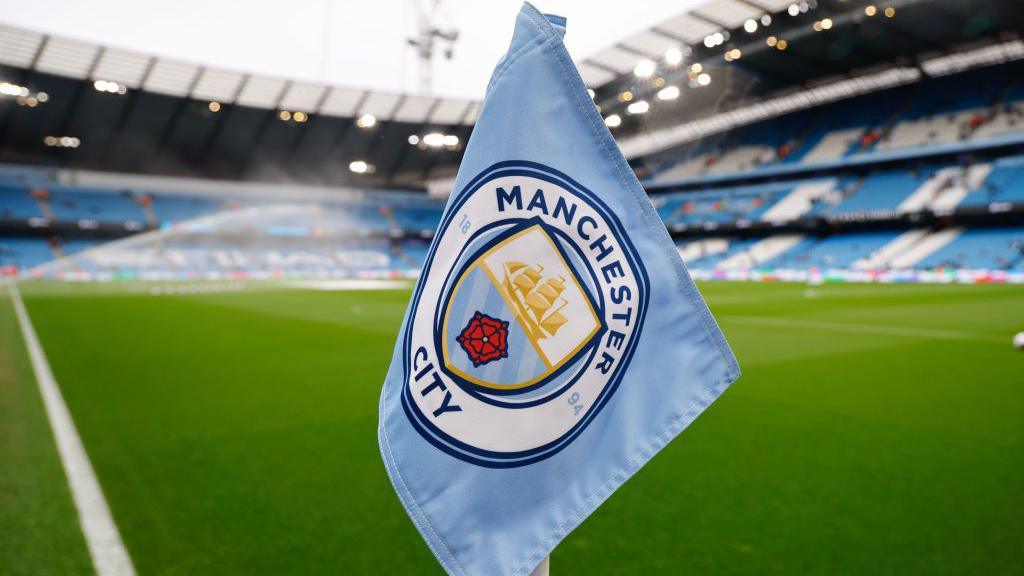Jack Grealish Slates Referee for Applying Rule He’s ‘Never Heard’

The Merseyside derby is always full of drama, passion and moments that people will talk about for years, but this time it was not just about the goals, the tackles, or the atmosphere at Anfield. It was about a decision that shocked players, fans and even television commentators. A decision from the referee that left one of the Premier League’s biggest names, Jack Grealish, furious and lost for words. After Liverpool defeated Everton 2-1, Grealish stood in front of the cameras and openly attacked the referee for applying what he described as a rule that he had never in his life heard of. His anger, his disbelief, and his frustration summed up the emotions of Everton after what they believed was a huge injustice in a game where every small detail mattered.
Liverpool went into the game confident, chasing another win to keep their perfect start to the season alive. Anfield was buzzing, the noise was deafening, the crowd believed this was another chance to show their strength. And in the early moments, it looked like a simple day for the home side. Ryan Gravenberch, the Dutch midfielder who has been growing in confidence under Arne Slot, scored the opening goal after just ten minutes. The crowd roared, red scarves waved, and Everton looked stunned. Before they could recover, Hugo Ekitike struck again, doubling Liverpool’s lead with a calm finish that showed why so many believe he is the next superstar for the club.
At 2-0, many thought Everton were finished. Liverpool had done this before, crushing teams early and controlling the match. But derbies are different. They are not just about tactics, they are about pride. Everton came out in the second half like wounded lions. They pressed higher, they fought harder, and when Idrissa Gueye smashed the ball into the net just before the hour mark, the game came alive. Suddenly Liverpool were nervous, Everton were growing, and the fans inside Anfield felt the tension.
It was in this period of Everton pressure that the drama exploded. Kiernan Dewsbury-Hall, full of energy and determination, won a free-kick in a dangerous position. He wanted to take it quickly, to catch Liverpool’s defense off guard, to use the chaos of the moment to create an equaliser. But before the ball could move, referee Darren England blew his whistle and stopped the play. Not only did he stop the quick free-kick, he pulled out a yellow card for Dewsbury-Hall. Shock filled the air. Everton players surrounded the referee in disbelief. The bench jumped to their feet. Even the commentators on television, Darren Fletcher and Ally McCoist, could not hide their surprise. They questioned the decision, they questioned the logic, and fans watching at home were left confused.
Jack Grealish, Everton’s leader and star on the pitch, was furious. He went straight to the referee, arms waving, voice raised, demanding answers. Cameras caught the confrontation, showing his anger and confusion. After the game, when he faced the TNT Sports microphones, he did not hold back. His words were sharp, his tone was emotional. “I’ve never seen a player in my whole life get booked for taking a quick free-kick… I don’t know where that rule has come in,” he said, shaking his head in disbelief. These were not just comments, these were accusations, direct shots at the referee’s knowledge of the game
For Grealish, it was not just about one yellow card. It was about fairness, about the spirit of football. In his mind, Dewsbury-Hall had done what players have been doing for decades—using quick thinking to take advantage. To punish him for that felt like a betrayal of the game itself. Grealish could not accept it, and he made sure the whole world knew.
The decision hurt even more because Everton were so close to turning the game around. After Gueye’s goal, the team believed. They pressed, they created moments, they had Liverpool panicking. Grealish himself worked tirelessly, running at defenders, demanding the ball, pushing his team forward. But Liverpool held on, using their experience, their resilience, and the energy of Anfield to protect their lead. When the final whistle blew, it was another win for the champions, another defeat for Everton, and another moment of heartbreak for their fans.
In his interview, Grealish did not only attack the referee. He also reflected on the match itself. He admitted Everton were poor in the first half, too slow, too passive. He said they had spoken at halftime, tried to change their approach, and that the second half was much better. But he could not hide his frustration. “Frustrating because if we had played like that, pressed like that from the start it would have been a different game. In the end we couldn’t get that last goal.” His words showed the pain of a player who gave everything but walked away with nothing.
He also spoke about Liverpool, giving them respect but also highlighting their weaknesses. “When I have watched them this season they have been so good but there has been a few times they have gone 2-0 up and then conceded two, we had the belief. We got the one back, a great finish Idrissa but we couldn’t get that last goal.” These comments showed that Everton did not fear Liverpool, that they believed they could compete, but on this day it was not enough.
For Grealish personally, it was another strong performance. He has been one of Everton’s best players this season, carrying responsibility, showing leadership, and becoming the face of their fight. But even the best players cannot control everything. He could not control a referee’s whistle, and that is what made the defeat so bitter.
The story has already created debate across the country. Fans are arguing about the rule, pundits are questioning whether the referee was right, and clips of the incident are being shared everywhere. Some defend the referee, saying Dewsbury-Hall did not wait for the signal. Others agree with Grealish, saying football is being killed by over-officiating. But no matter what side people take, everyone is talking about it, and that shows how big the controversy has become.
For Everton, the focus must quickly shift. They face Wolves in the Carabao Cup, a chance to forget the derby pain and chase silverware. Then comes West Ham in the league, another test of their ability to recover. For Liverpool, it is another step in their march, another reminder that even when they are not at their best, they find ways to win. But the shadow of this decision will not fade quickly
What makes this story so powerful is not just the rule, but the emotion. Football is about emotion. Grealish’s face, full of anger and disbelief, will be remembered. His words, attacking the referee with raw honesty, will be replayed. Fans will argue about this for weeks. Was it right? Was it wrong? Should referees have more power or less? These questions will not go away.
Jack Grealish has always been a player who speaks with his heart. At Manchester City, at England, and now at Everton, he has shown that he will not hide his feelings. Sometimes that gets him into trouble, sometimes it makes him loved by fans. But in moments like this, it makes him the voice of the game. He spoke for every player who has ever felt cheated, every fan who has ever felt robbed, and every coach who has ever looked at a referee and wondered what they were thinking.
The Merseyside derby of September 2025 will be remembered for Gravenberch’s goal, for Ekitike’s finish, for Gueye’s fight, but most of all, it will be remembered for Darren England’s decision and Jack Grealish’s fury. It was football at its rawest—beautiful, brutal, unfair, and unforgettable.
And as Everton prepare for the next game, as Liverpool celebrate another win, the echoes of Grealish’s words still hang in the air: “I’ve never seen a player in my whole life get booked for taking a quick free-kick.”
Those words tell the story. Those words show the pain. Those words ensure that this derby will never be forgotten.















